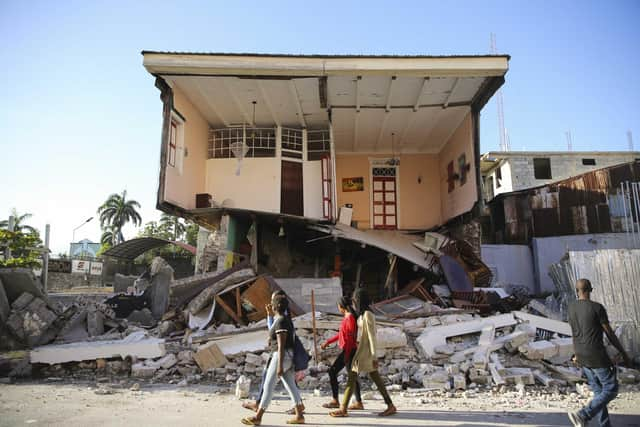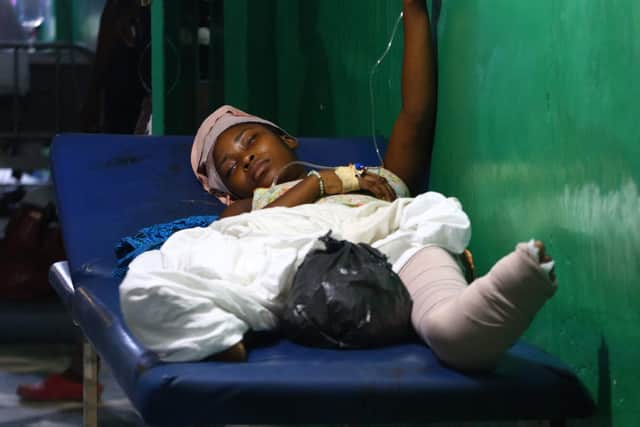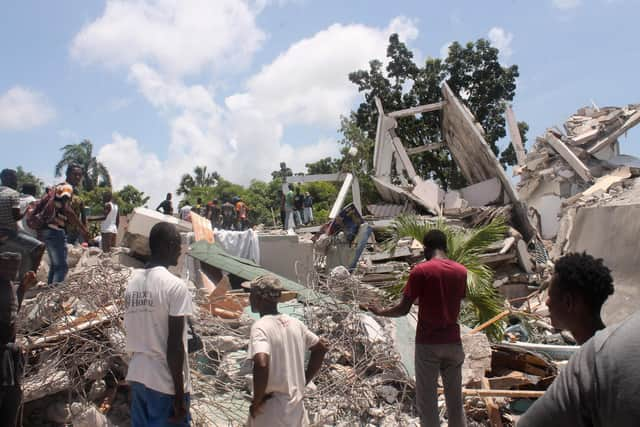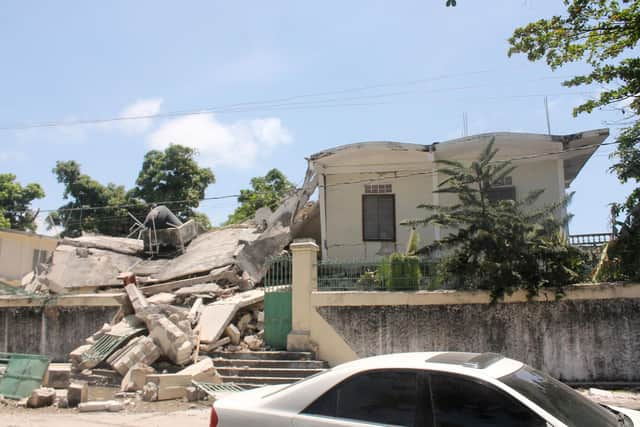Where is Haiti and how much damage has been caused: Massive earthquake kills hundreds
Prime minister Ariel Henry said he was sending aid to areas where towns were destroyed and hospitals overwhelmed with incoming patients.
The epicentre of the quake was about 78 miles west of the capital of Port-au-Prince, the US Geological Survey said, and widespread damage was reported.
More than 1,800 people have also been injured.
Advertisement
Hide AdAdvertisement
Hide Ad

Haiti is situated in the Greater Antilles archipelago of the Caribbean Sea, to the east of Cuba and Jamaica.
Haiti's civil protection agency said the death toll stood at 304 and that search teams would be sent to the area.
Rescue workers and bystanders were able to pull many people to safety from the rubble, the agency said Saturday on Twitter. It said injured people were still being taken to hospitals.


Mr Henry declared a one-month state of emergency for the whole country and said he would not ask for international help until the extent of the damages was known.
He said some towns were almost completely razed and the government had people in the coastal town of Les Cayes to help plan and co-ordinate the response.
"The most important thing is to recover as many survivors as possible under the rubble," Mr Henry said.
"We have learned that the local hospitals, in particular that of Les Cayes, are overwhelmed with wounded, fractured people."


Mr Henry said the International Red Cross and hospitals in unaffected areas were helping to care for the injured, and appealed to Haitians for unity.
"The needs are enormous,” he said.
Advertisement
Hide AdAdvertisement
Hide Ad"We must take care of the injured and fractured, but also provide food, aid, temporary shelter and psychological support.”
Later, as he boarded a plane bound for Les Cayes, Mr Henry said he wanted "structured solidarity" to ensure the response was co-ordinated to avoid the confusion that followed the devastating 2010 earthquake, when aid was slow to reach residents after as many as 300,000 were killed.


Among those killed in the earthquake was Gabriel Fortune, a long-time lawmaker and former mayor of Les Cayes. He died along with several others when his hotel, Le Manguier, collapsed, the Haitian newspaper Le Nouvelliste reported.
Philippe Boutin, 37, who lives in Puerto Rico, but visits his family annually in Les Cayes, said his mother was saying morning prayers when the shaking began, but was able to leave the house.
The earthquake, he said, coincided with the festivities to celebrate the town's patron saint, adding the hotel was probably full and the small town had more people than usual.
"We still don't know how many people are under the rubble," he said.
Humanitarian workers said information about deaths and damage was slow coming to Port-au-Prince because of intermittent internet.
Also complicating relief efforts was gang activity in the seaside district of Martissant, just west of the Haitian capital.
Advertisement
Hide AdAdvertisement
Hide Ad"Nobody can travel through the area," Ndiaga Seck, a Unicef spokesman in Port-au-Prince, said by phone. "We can only fly over or take another route."
The reports of overwhelmed hospitals come as Haiti struggles with the pandemic and a lack of resources to deal with it.
Just last month, the country of 11 million people received its first batch of US-donated coronavirus vaccines, via a United Nations programme for low-income countries.
Videos posted to social media showed collapsed buildings near the epicentre and people running into the streets.
People in Port-au-Prince felt the tremor and many rushed into the streets in fear, although there did not appear to be damage there.
Naomi Verneus, a 34-year-old resident of Port-au-Prince, said she was jolted awake by the earthquake and that her bed was shaking.
"I woke up and didn't have time to put my shoes on,” she said.
"We lived the 2010 earthquake and all I could do was run. I later remembered my two kids and my mother were still inside. My neighbour went in and told them to get out. We ran to the street."
Advertisement
Hide AdAdvertisement
Hide AdPaul Caruso, a geophysicist with the USGS, said aftershocks were likely to continue for weeks or months, with the largest so far registering a magnitude 5.2.
The impoverished country, where many live in tenuous circumstances, is vulnerable to earthquakes and hurricanes.
It was struck by a magnitude 5.9 earthquake in 2018 that killed more than a dozen people, and a vastly larger magnitude 7.1 quake that damaged much of the capital in 2010 and killed an estimated 300,000 people.
The National Hurricane Centre has also forecast that Tropical Storm Grace will reach Haiti late Monday night or early Tuesday morning.
The earthquake struck more than a month after president Jovenel Moise was killed, sending the country into political chaos.
His widow, Martine Moise, posted a message on Twitter calling for unity among Haitians: "Let's put our shoulders together to bring solidarity. It is this connection that makes us strong and resilient. Courage. I am always by your side."
Humanitarian aid groups said the earthquake would only worsen the nation's suffering.
"We're concerned that this earthquake is just one more crisis on top of what the country is already facing, including the worsening political stalemate after the president's assassination, Covid and food insecurity," said Jean-Wickens Merone, spokesman for World Vision Haiti.
Advertisement
Hide AdAdvertisement
Hide AdUS President Joe Biden has authorised an "immediate US response" to help Haiti.
He said USAID would work to support efforts to "assess the damage and assist efforts to recover those who were injured and those who must now rebuild".
"In what is already a challenging time for the people of Haiti, I am saddened by the devastating earthquake," he said.
Comments
Want to join the conversation? Please or to comment on this article.
